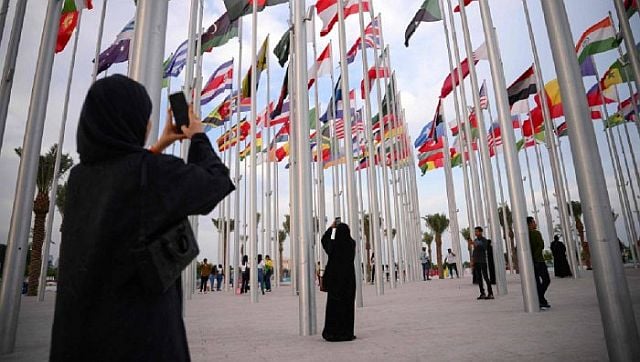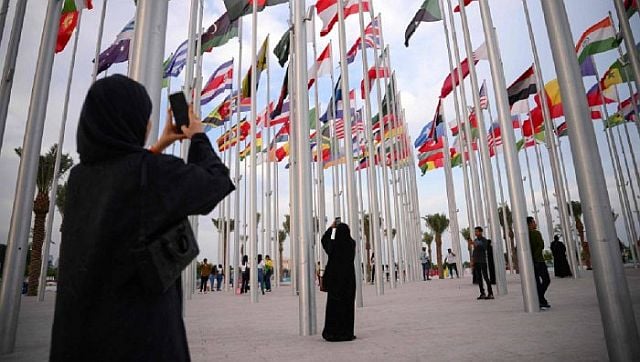FIFA World Cup 2022: How the event is fueling misogyny

Women who are attending the World Cup in Qatar have been advised to follow a strict dress code. AFP
One of the fundamental questions relating to the 2022 World Cup being hosted by Qatar is what message this gives to women and girls around the world. FIFA purports to uphold human rights. Its decision, in 2010, to award the hosting duties for the 2022 tournament to Qatar was not, however, without controversy.
In the 12 years since, these issues have only intensified. The treatment of migrant workers throughout the run-up to the event has garnered continued attention, as has the way LGBTQ+ rights and women’s rights are contravened by local law.
Misogyny, a sexist contempt and hatred of women, aims to keep women in a lower position than men within a patriarchal society. With discrimination against women enshrined in Qatari law — which, among other things does not criminalise domestic violence or sexual assault — misogyny is being beamed through televisions internationally, via the means of the 2022 men’s football World Cup.
Women in Qatar
Qatari law undergirds a profoundly patriarchal system. Sex outside of marriage is banned and Qatari women can only marry with the permission of a male guardian.
This controversial system of male guardianship also shapes women’s ability to study, drive and travel. Men have the unquestioned right to divorce, yet the grounds on which a woman can apply for divorce is limited. Wives are expected to obey husbands and their priority is seen to be home making.
Women cannot pass nationality on to their children, as men can, nor can they be their children’s primary carer in case of divorce or the death of their husband. Female beneficiaries only get half of any inheritance their brothers receive.
Women are asked to provide proof of marriage to receive sexual health and antenatal care. And they have to abide by a strict dress code.
Crucially, domestic violence and rape is not criminalised. While family law forbids moral or physical assault by husbands against wives, reporting domestic abuse or sexual violence is frowned upon as it is seen to bring shame upon the family.
Both the lack of prosecution for domestic violence and the victim blaming that surrounds sexual assault point towards possible risks for any women attending the World Cup.
Research shows that women face a heightened risk of sexual assault at any major sports tournament. It also shows, in the UK, the increase in domestic violence around World Cup matches and other big sporting tournaments.
Women at the World Cup
Reports have highlighted that this heightened risk has already resulted in many women not wanting to travel to Qatar for the World Cup. This, in itself, is discriminatory.
Those who do head for Doha are advised to follow a strict dress code. FIFA’s position on this is unclear. It states that people attending matches can wear what they want but also that they must respect local laws.
When in public, women in Qatar are expected to cover up. They must forgo tight clothing and not show their cleavage, knees or shoulders, and contravening these rules can result in prison or fines.
Official advice for travellers published by the UK government also covers strict laws against relationships outside of marriage. There are multiple cases of visitors being punished for being seen to be in contravention of these laws.
In June 2021, a Mexican world cup official reported that she was sexually assaulted. As a result of this, she was accused of extramarital sex, which is against Qatari laws, rather than being seen as a victim of sexual violence. This saw her threatened with imprisonment and 100 lashes.
And in 2020, 13 Australian women were forcibly removed, at gunpoint, from grounded Qatar Airways planes in Doha. They were then forced to undergo internal examinations, without their consent, as officials sought to find the mother of a newborn baby who had been found in the airport.
This subordination of women is in direct conflict with human rights laws. The United Nations and the European Convention on Human Rights categorically state that any compromise of women’s rights contravenes international human rights laws.
Significant progress has been made in terms of women’s rights worldwide in the last 25 years, not least in the sphere of football itself. Women’s football has gathered enormous traction of late, particularly with the success of the England women’s team winning the European cup.
By holding the men’s World Cup in Qatar, and thereby not sanctioning the lack of progress the country has made in terms of women’s rights, the impression given is that these rights are discretionary. Preventing discrimination and violence against women and girls, however, is never optional. This is not a cultural issue. It is a serious breach of human rights.![]()
This article is republished from The Conversation under a Creative Commons license. Read the original article.
Read all the Latest News, Trending News, Cricket News, Bollywood News,
India News and Entertainment News here. Follow us on Facebook, Twitter and Instagram.
For all the latest Sports News Click Here

